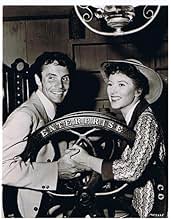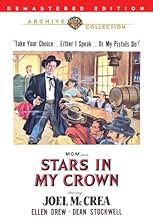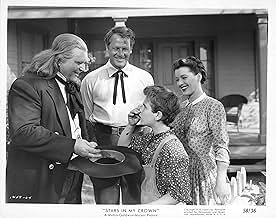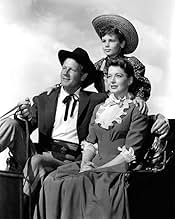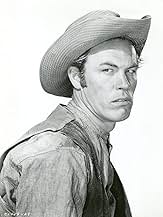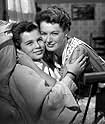IMDb RATING
7.4/10
2.7K
YOUR RATING
In 1865, the small Southern town of Walesburg has become so dangerous that Parson Josiah Doziah Gray gives his sermons while holding a gun.In 1865, the small Southern town of Walesburg has become so dangerous that Parson Josiah Doziah Gray gives his sermons while holding a gun.In 1865, the small Southern town of Walesburg has become so dangerous that Parson Josiah Doziah Gray gives his sermons while holding a gun.
- Awards
- 1 win total
Marshall Thompson
- Narrator
- (voice)
James Arness
- Rolfe Isbell
- (uncredited)
Jessie Arnold
- Annie
- (voice)
- (uncredited)
Polly Bailey
- Mrs. Belsher
- (uncredited)
Featured reviews
This, the second of director Jacques Tourneur's westerns after CANYON PASSAGE and one of several collaborations with actor Joel McCrea, finds him at least at first sight as far removed from the ambiguous psychological Gothic horror films he became famous through a couple years back for Val Lewton's RKO horror unit, yet once we scratch the surface, peel back the layers of faith-restoring sentimentality which lies at the film's core, we'll find this can be a pretty dark film.
Not only because the life of a small rural town in the post-Civil War South has to face a typhoid epidemic and Klan racism because the 'family' nature of the film ensures these are merely obstacles to be overcome, each of them a lesson learned in Christian love and brotherhood not only for the characters but also for the audience, but mostly because of the way Tourneur shoots the major set-pieces that revolve around them. Going back to what he learnt next to Val Lewton at RKO, Tourneur gives an otherwise saccharine film a dark underbelly, Klansmen pinning threatening notes on negros in front of burning crosses et al.
Yet STARS IN MY CROWN never feels like a film whose message and theme is beneath the director. Tourneur approaches the story in earnest. The truth is that it takes a while for things to get going. That the film is a bit too episodic and scattershot to really register until the final 15 minutes when parson Joel McCrea has to face off alone with a mob of Klansmen to save the life of a negro. That the small vignettes scattered throughout the film push the two major plots (smalltown biggotry and typhoid epidemic) a bit too far apart, the result making the first half a pretty meandering anemic affair. But the denouement, for all its saccharine 'everybody gets together to sing hymns in the church' quality, feels honest and I find it hard to fault such a film. Building something as emotionally earnest and unassuming as this is harder than tearing it down with cynicism.
Not only because the life of a small rural town in the post-Civil War South has to face a typhoid epidemic and Klan racism because the 'family' nature of the film ensures these are merely obstacles to be overcome, each of them a lesson learned in Christian love and brotherhood not only for the characters but also for the audience, but mostly because of the way Tourneur shoots the major set-pieces that revolve around them. Going back to what he learnt next to Val Lewton at RKO, Tourneur gives an otherwise saccharine film a dark underbelly, Klansmen pinning threatening notes on negros in front of burning crosses et al.
Yet STARS IN MY CROWN never feels like a film whose message and theme is beneath the director. Tourneur approaches the story in earnest. The truth is that it takes a while for things to get going. That the film is a bit too episodic and scattershot to really register until the final 15 minutes when parson Joel McCrea has to face off alone with a mob of Klansmen to save the life of a negro. That the small vignettes scattered throughout the film push the two major plots (smalltown biggotry and typhoid epidemic) a bit too far apart, the result making the first half a pretty meandering anemic affair. But the denouement, for all its saccharine 'everybody gets together to sing hymns in the church' quality, feels honest and I find it hard to fault such a film. Building something as emotionally earnest and unassuming as this is harder than tearing it down with cynicism.
STARS IN MY CROWN is a nice slice of life movie about the life about a country preacher in the years immediately following the Civil War. Joel McCrea plays the preacher and Dean Stockwell plays an orphan that is taken in by the preacher and his wife. However, the film isn't just about them but about the people in the town. It focuses quite a bit on a young and somewhat cocky doctor as well as a gentle and beloved Black man (played exceptionally by the wonderful character actor, Juano Hernandez).
Both plots are exceptional--particularly the one involving Hernandez because the film dared in 1950 to attack prejudice--something Hollywood was seldom willing to do at that time. Often, when Blacks were in mainstream films, they were one-dimensional and the racial divide in America was ignored. For 1950, this was a brave film--though some will no doubt notice that the film is perhaps a bit overly idealistic in how it portrayed how the White Southerners generally loved Hernandez.
The plot involving the doctor was also rather touching and had a lot to say about the supposed gap between faith and science. I particularly liked how McCrea AND the doctor struggled with this divide.
STARS IN MY CROWN reminds me of another film that is also about a small town preacher (ONE FOOT IN HEAVEN) and both have a nice gentle spirit but also aren't preachy or saccharine despite being films about the clergy. I especially like how both ministers (in this case, Joel McCrea and in the other film, Frederic March) were human beings--not dull caricatures. Some may be offended because the films AREN'T really religious movies (you get no Gospel or Bible-thumping here) but for a general audience these films are sure to please. I recommend both heartily because they were written so well and the acting was on target. See these films.
Both plots are exceptional--particularly the one involving Hernandez because the film dared in 1950 to attack prejudice--something Hollywood was seldom willing to do at that time. Often, when Blacks were in mainstream films, they were one-dimensional and the racial divide in America was ignored. For 1950, this was a brave film--though some will no doubt notice that the film is perhaps a bit overly idealistic in how it portrayed how the White Southerners generally loved Hernandez.
The plot involving the doctor was also rather touching and had a lot to say about the supposed gap between faith and science. I particularly liked how McCrea AND the doctor struggled with this divide.
STARS IN MY CROWN reminds me of another film that is also about a small town preacher (ONE FOOT IN HEAVEN) and both have a nice gentle spirit but also aren't preachy or saccharine despite being films about the clergy. I especially like how both ministers (in this case, Joel McCrea and in the other film, Frederic March) were human beings--not dull caricatures. Some may be offended because the films AREN'T really religious movies (you get no Gospel or Bible-thumping here) but for a general audience these films are sure to please. I recommend both heartily because they were written so well and the acting was on target. See these films.
An almost plot less piece of Americana and one of Jacques Tourneur's very finest films, "Stars in My Crown" is set in a small American town in the aftermath of the Civil War and it follows the daily happenings in the lives of the townsfolk, principle of whom is Joel McCrea's parson, (it's a wonderful performance). Then there's the parson's wife, the young doctor, the school mistress and the boy, (Dean Stockwell), who as a man, (an unseen Marshall Thompson), narrates the film. They are all beautifully played as are Ed Begley's greedy storekeeper, Juano Hernandez's dirt farmer and Charles Kemper's magician.
It's a very simple piece, a series of scenes on which there hangs the thinest thread of a plot, in feeling and in structure not dissimilar to John Ford's "The Sun Shines Bright". It's also one of the few really good 'religious' pictures yet one in which religion isn't centre stage but something that's just there infusing every scene and it's not at all sentimental yet ultimately it's very moving. It's cult status is thoroughly justified.
It's a very simple piece, a series of scenes on which there hangs the thinest thread of a plot, in feeling and in structure not dissimilar to John Ford's "The Sun Shines Bright". It's also one of the few really good 'religious' pictures yet one in which religion isn't centre stage but something that's just there infusing every scene and it's not at all sentimental yet ultimately it's very moving. It's cult status is thoroughly justified.
Enjoyed this film. It portrayed a post-Civil War mid-west (so it appeared)community in a way that could make you nostalgic. Not that everything was perfect: the Ku Klux Klan harassing a freed black man (the distinguished Puerto Rican actor Juano Hernandez)primarily because they want his land. That preacher Joel McCrae manages to talk them out of it by appealing to their basic decency works without being cloying. Initially a muscular Christian, he here uses his brain to do the Lord's work. Also believable was the community's vulnerability to disease. They had no laboratory-testing facilities to see if that well-water was the source. McCrae's self doubt in the face of all this is believable.As for the cast, I'm pretty sure I spotted an uncredited Peter Graves as one of Alan Hale's offspring.
I must admit that this movie took its time to grab me.It's a movie which grows on you.Some called it "western" but western fans won't get anything of it.It's rather a chronicle,sweet memories of a grown up who remembers his dear past with a marvelous preacher man and a loving auntie.
There is no plot but subplots for it is primarily the depiction of a city in the south.Around the minister,we find the "new generation" doctor who has his doubts and who doesn't believe that healing the soul is that much important;he comes into conflict with Gray .There's also a KKK side and their "methods" to do good old Uncle Famous Pril away from his valuable property.The scene which finally won me over was the reading of Pril's "last wills" .When you discover the truth,you won't believe your eyes!This scene alone raises the movie to greatness by recurrence.And what a tuneful canticle!
There is no plot but subplots for it is primarily the depiction of a city in the south.Around the minister,we find the "new generation" doctor who has his doubts and who doesn't believe that healing the soul is that much important;he comes into conflict with Gray .There's also a KKK side and their "methods" to do good old Uncle Famous Pril away from his valuable property.The scene which finally won me over was the reading of Pril's "last wills" .When you discover the truth,you won't believe your eyes!This scene alone raises the movie to greatness by recurrence.And what a tuneful canticle!
Did you know
- TriviaCast includes a young James Arness and Amanda Blake. They appeared together for 19 (of 20) seasons on the television series Gunsmoke (1955) as Matt Dillon and Kitty Russell.
- GoofsMovie state narrator states "the first hard years following the war between the states". The title song was not written until 1897.
- Quotes
John Kenyon: There's no writin' on here. This ain't a will.
Josiah Doziah Gray: Yes, it is, son. It's the will of God.
- ConnectionsReferenced in The Vanquished (1953)
- How long is Stars in My Crown?Powered by Alexa
Details
Box office
- Budget
- $1,175,000 (estimated)
- Runtime
- 1h 29m(89 min)
- Color
- Aspect ratio
- 1.37 : 1
Contribute to this page
Suggest an edit or add missing content


